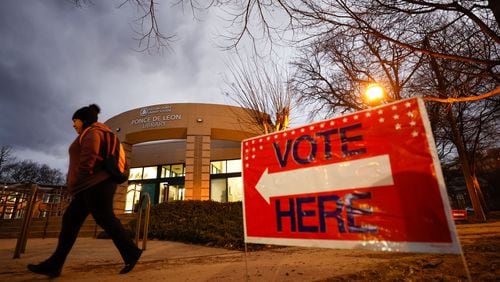Where is the opioid abuse epidemic happening? Not where you might expect.
Cobb County has premature death rates much better than most other metro counties. But in the last three years for when data are available, it saw a massive spike in overdose deaths, far above that of any other county in the Atlanta region. And that is a feat, since deaths are rising metrowide.
The opioid epidemic wracking the nation is playing out brutally in every area of metro Atlanta, even, or especially, in areas caught unawares. A new data analysis mapping out the opioid death toll in the 10-county Atlanta region was released Tuesday exclusively to The Atlanta Journal-Constitution by the Atlanta Regional Commission. It appeared to confirm what experts have identified as the "deadly triangle" — stark rises in opioid deaths in the northern Atlanta suburbs previously known for quiet, affluent subdivisions and competitive schools.
The ARC is best known as the gateway for metro Atlanta’s federal transportation funds, and it traditionally produces research on demographic data such as housing. But it delved into the opioid data, officials there said, because it has become clear that the issue has become a quality-of-life factor in the metro area.
U.S. Rep. Karen Handel spent Tuesday afternoon hosting an “opioid summit” in her district, which encompasses some of those northwestern suburbs.
“What strikes me is that no one is immune,” Handel said. “This is not a crisis that is discriminating based on age or race or ZIP code or even income level.”
“It’s an explosion,” said Neil Campbell, the executive director of the Georgia Council on Substance Abuse. The numbers show that prescription opioids are a key part of what’s driving the increase. Ironically, people with better access to health care may have had better access to opioids.
“If a doctor’s prescribing you something, you don’t see it the same way as buying something off a street corner,” Campbell said. “A kid gets his wisdom teeth out and he gets OxyContin. It’s like, what the heck? I think those prescribing practices are starting to get looked at. But it’s a little late; the horse is out the barn door.”
The path to widespread addiction from prescription opioids has been widely documented: A legitimate patient gets hooked, then switches to street drugs or illicit pharmaceuticals when the prescriptions run out. And the addiction epidemic is so widespread that there aren’t enough rehabilitation services or after-rehab support.
Missy Owen is a Cobb resident and educator. She lost her son, Davis, to an overdose in 2014.
“Nine out of 10 people who were either in rehabilitation or incarceration were coming out and relapsing, and many of those people were relapsing and dying,” Owen said. “There was no after care in the world of addiction and recovery in our county.”
She and her family founded The Zone, a recovery community center in Cobb, in order to fill what they saw as a gap in support services for those in recovery.
Justin Jackson works at The Zone and has been in recovery for two years. He said The Zone gave him a place to go and a purpose after numerous stints in jail and rehab. Jackson and Owen both spoke at Handel’s event.
“After treatment, there was nowhere to go, there was no way to be around other clean people and find out what was fun,” Jackson said. “I played my first game of sober pool at The Zone.”
Treatment and after-treatment support programs are expensive. This year, the Georgia Legislature and Congress both voted new money to deal with opioids. Experts say it's a good start but not enough.
Buzz Ahrens is chairman of the Cherokee County Commission and yes, he knows about the epidemic. The commissioners brought in a staffer from the U.S. Centers for Disease Control and Prevention to talk about data. The county’s public safety agencies have formed a joint task force with the narcotics squad to deal with opioids specifically. Lawyers are talking to the commission about suing the pharmaceutical companies that are accused of first hawking opioids with incorrect information about their addictive qualities. As he spoke to the AJC on Tuesday, he was preparing for another meeting with the lawyers that evening.
He called the county-level effort to stem opioids “like Whac-a-Mole,” the game where a player bats down a mole only to have more pop up beside it.
“It’s a convoluted mess,” Ahrens said. “Here’s the real issue. Everybody knows about it intuitively. They don’t know it specifically. They don’t know it’s in their own backyard.”
Efforts such as Cherokee’s to prevent distribution are something law enforcement can do now, as are “accountability courts” that Cobb has established. They divert some drug users to treatment rather than jail.
Cobb Commissioner Bob Ott said graduates of accountability court are far more likely to hold down a job and complete their education compared with those in regular courts, and they also have lower recidivism rates.
Ott said Cobb would like to expand its number of “safe stations” — places such as firehouses where people can voluntarily surrender drugs and paraphernalia without fear of arrest.
Cobb is also launching an opioid awareness webpage that allows users to look up medication drop-off locations and treatment centers, statistics on Cobb opioid deaths, and an “opioid data status dashboard” that will collect and display information from different agencies.
State Sen. Renee Unterman and state Rep. Sharon Cooper are the chairwomen of the health committees in the state Legislature, and each has advocated for action on opioids. Unterman has pointed out the need for significant treatment infrastructure, and she lobbied for money in the state budget. Gov. Nathan Deal is scheduled to finalize the budget Wednesday, and as sent to him it contains $4 million to the state’s Office of Addictive Diseases, as well as other funds that can fight opioid addiction.
Campbell was glad to see that but says it is small potatoes compared with the $23 million that was cut in 2009 when the Great Recession struck. “We have never caught up,” she said, even as opioid deaths have increased far more.
Handel said she hoped to build support for prevention and recovery efforts targeting young people.
“I’m going to be open to whatever it is that we can do that will have a practical, impactful approach to this,” she said.
Opioids remain a top concern for her constituents.
“Just about every week we get calls about it,” she said.
Opioid death rates
Since 1999 in the 10-county Atlanta region, the number of prescription opioid overdose deaths has increased at more than five times the rate of deaths overall. The Atlanta Regional Commission released a data analysis exclusively to The Atlanta Journal-Constitution on Wednesday mapping out the opioid death toll in the 10-county Atlanta. Below are the rates of opioid overdose death per 100,000 residents in 2002, when available, compared with 2016, the last year data are available.
Cherokee
2002: 3.7
2016: 15.5
Clayton
2002: 5.2
2016: 7.6
Cobb
2002: 3.3
2016: 14.1
DeKalb
2002: 3.0
2016: 6.8
Douglas
2002: 4.7
2016: 18.8
Fayette
2002: N/A
2016: 5.4
Fulton
2002: 4.8
2016: 12.0
Gwinnett
2002: 2.3
2016: 6.8
Henry
2002: N/A
2016: 11.4
Rockdale
2002: N/A
2016: 9.5
One county’s trend: Cobb and overdoses per 100,000 people
2002
All overdose deaths: 4.7
2016
Prescription opioid overdose deaths: 7.9
All overdose deaths: 16.1
Source: The Atlanta Regional Commission









